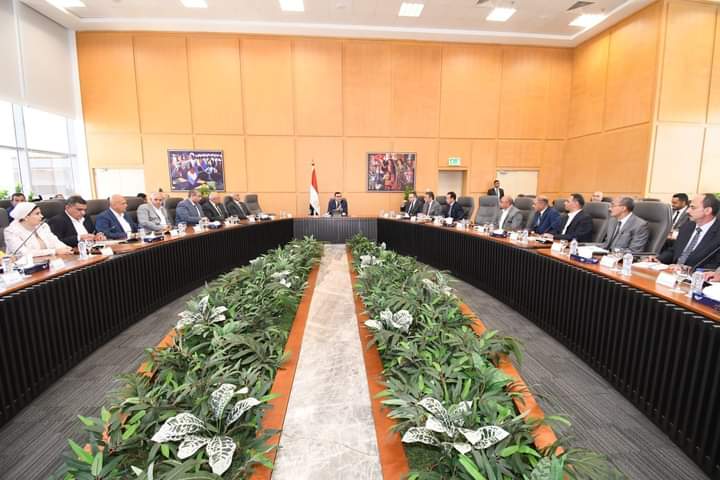
Engineer Sherif El-Sherbiny, Minister of Housing, Utilities, and Urban Communities, convened a meeting with officials from the New Urban Communities Authority and heads of the new cities. The focus was on monitoring progress of the Authority's work plan and ensuring quality of life, services, and sustainable development in the new cities’ projects. Ministry officials were also present.
Highlighting the team spirit, the
minister emphasized unity and shared goals. He expressed his gratitude to
President Sisi for appointing him as he is a former Authority member to the
housing portfolio, signifying the trust of the leadership and the Authority's
strong talent pool. To ensure continuous progress, El-Sherbiny pledged regular
meetings and field visits to monitor construction efforts.
El-Sherbiny outlined a series of
directives for the new city leaders. Top priorities include maximizing
recurring revenue and establishing self-sustaining financial resources for each
city. This ensures long-term development and funds maintenance, operation,
upgrades, and replacements. He emphasized the importance of optimizing resource
utilization and management across all new cities.
The minister stressed the value
of specialized consultants. Their role is to develop city-specific advertising
plans that leverage prime locations, define appropriate advertising formats to
preserve the visual identity, and set achievable financial targets for
advertising revenue. Finally, El-Sherbiny called for maximizing waste
utilization across all categories by partnering with recycling specialists.
El-Sherbiny prioritized robust
maintenance plans for city projects to safeguard infrastructure, maximize
return on investment, and ensure efficient service providers. This includes
keeping roads in top condition, maintaining cleanliness, and enhancing
entrances, landscaping, and signage.
Furthermore, he directed a swift
inventory of vacant land in all cities, investment opportunities, completed and
ongoing housing units. Plans for launching these units and accelerating project
completion were emphasized. Housing projects will be divided into phases for
sequential delivery. Additionally, operational service buildings and facilities
will be launched.
He tasked the heads of the new cities
authorities to develop visions and plans for maximizing sustainable finances,
collecting dues, identifying city challenges with proposed solutions, and
outlining strategies to address stalled projects.
El-Sherbiny further directed
close monitoring of partnership and investment projects, ensuring their on-site
progress. Projects will be divided into phases for sequential completion, with
attention to external landscaping. He emphasized strict collection of Authority
dues and accelerating work on development initiatives.
In a separate focus on human
resources, El-Sherbiny highlighted the importance of training and capacity
building for all new city sectors. This includes empowering young leaders,
assigning them specific responsibilities, and optimizing staffing based on
project needs. Additionally, selective hiring for public-facing roles and
dedicated centers for developers and major clients were mandated. He called for
collaboration with local government and parliamentarians, coordination with
other state agencies for joint projects, and direct engagement with citizens
through responsive communication and regular meetings.
El-Sherbiny emphasized future
planning for water and sanitation in new cities. Short- and long-term plans
will address needs based on occupancy rates. This includes system upgrades,
efficient resource management, equipment hubs for emergencies, and winter
preparedness plans. Performance will be monitored through regular committees
with water regulatory agencies.
He also directed development
plans for industrial zones. Vacant land will be utilized to generate revenue
for further development. Collaboration with industrial developers is
encouraged. Additionally, successful city initiatives will be shared, and
digital transformation across the new cities authorities will be expanded.
El-Sherbiny emphasized
performance evaluation for officials in new cities. This includes following up
on task completion and holding those who underperform accountable. Clear
metrics will be used, considering each city's unique circumstances. Key
performance indicators include investment and development plans, securing
sustainable funding, achieving financial stability, and collection rates.
He concluded by stressing good
and innovative management for each city. This entails optimizing resources,
maximizing returns, and empowering skilled personnel. Self-regulation and
clear, objective management practices will be prioritized, replacing reliance
on individual leadership.
Following their presentations, the minister addressed questions and concerns raised by the new city authority heads. He emphasized the importance of ongoing communication to maintain momentum, accelerate development, and expedite project completion. El-Sherbiny urged the heads to redouble their efforts in elevating their respective cities and safeguarding the significant progress and remarkable growth achieved by the New Urban Communities Authority and its branches in recent years.





